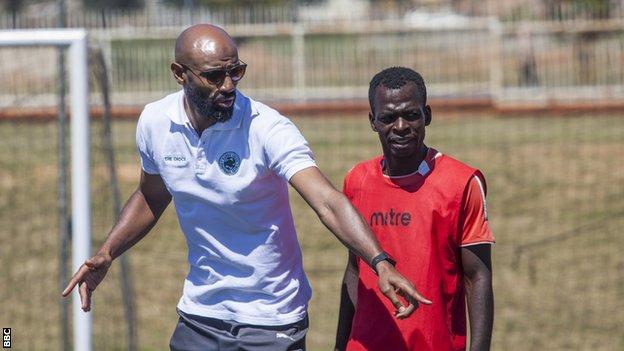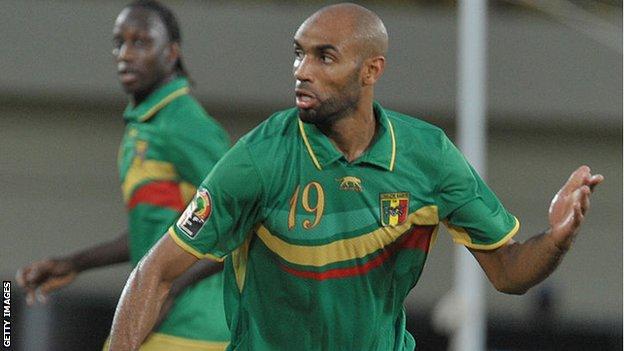
Mali football legend Frederic Kanoute has told African football hopefuls that talent alone is not enough for a successful career and the key is hard work.
The 42-year-old was the 2007 African Footballer of the Year and is now working on developing a new generation of talent trough his 12 Management Consultancy firm.
The former Lyon, Sevilla and Tottenham striker was recently in Zambia to offer his tips for the latest hopefuls.
"Keep working, talent is not enough. You need to work hard - have an ethic of working hard and discipline," Kanoute told BBC Sport.
"You have to be very strong mentally as well. We shouldn't forget, football is not only about playing around with a ball.
"There is a technical aspect. There is a tactical aspect. There is a physical aspect. There is a mental aspect," he added.
Kanoute's work in Zambia has already proved successful with two youngsters from local side Kafue Celtics given the chance to play in Europe.
The 2017 African Young Player of the Year, Patson Daka, and his Enock Mwepu were signed by Austria's Red Bull Salzburg of Austria.
They have gone onto win the Austrian league played in the Europa League.
It is not the big money moves that Kanoute chooses to focus on but is more about providing African talent with an opportunity.
Kanoute says he has been encouraged by the apparent wealth of talent in Zambia especially at Kafue Celtics where he works with club owner Lee Kawanu.
"In 2015 I met Kalusha [Bwalya], I have known since childhood. He introduced me to Lee (Kawanu) here in Zambia," he explained.
"It resonated inside me quickly because I know Zambia has great talent. Since I came here the first time, I was not disappointed because there is a will, strong motivation to develop football."

Frederic Kanoute has been working with young players in Zambia
Kanoute says whilst there is pressure on African teams to deliver instant results, it is important to build for the future.
"Development of players has to be managed bottom up, we have to believe in the youth, and obviously it takes time," he says.
"Ideally we need to tackle the present because we need results now and it will boost the youth and will also boost everything for the development but we need to think long term."
The joint topscorer at the 2004 Africa Cup of Nations says young people need an opportunity to develop their talent through established youth structures.
"I believe in a strong youth system, we need to give them all the opportunities so that they can have success," he says.
"Development will not just happen but needs to be within a structured way. It won't just come without investing in the youth."
Kanoute says Zambia's failure to qualify for the last two Nations Cup tournaments should be seen as an opportunity to invest in the future.
"The fact that they have not qualified does not mean they are no longer a power house. It is an opportunity to invest in youth structures," he says.
"If one thinks that you can just get world class players hoping for a quick fix, it will not work. We need to think long term by working with the youths.'

Frederic Kanoute was named the 2007 African Footballer of the Year
Kanoute believes that his native Mali have a perfect blend of youth and experience to do well at the tournament.
Mali, who have never won the Nations Cup, are in a group alongside Angola, Tunisia and debutants Mauritania.
"I hope at least they are going to go through the group stage without wasting too much energy on the road," he said.
"I think it is an exciting team that has been renewed, a little bit younger.
Kanoute was in two minds about the benefits of an expanded 24-nation tournament.
"On one hand it is good for other nations to take part and to have a chance to show their skills to other Africans and the world. So more participants is more positive," he says.
"On the other hand, the level of the competition could drop a little bit…I do not know we have to see how it goes."
The 2006 and 2007 Europa League winner with Sevilla is happy that the Confederation of African Football has moved the tournament from January.
"We have to think as a whole nation of football - not just as Caf, Uefa and Fifa - to make it easier for national teams. It is better to have it when there is no league," he says.
"When they (the players) leave for Afcon they lose their spot, I have gone through that myself. When you come back you have lost your spot."